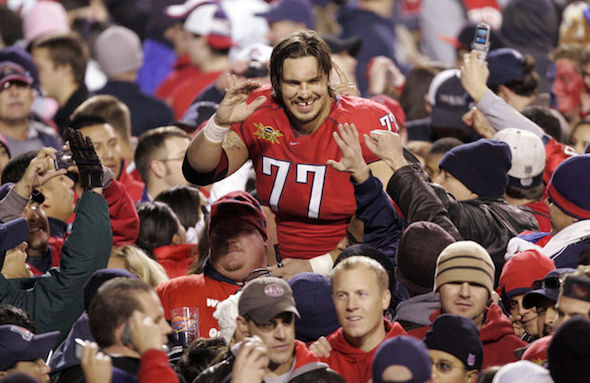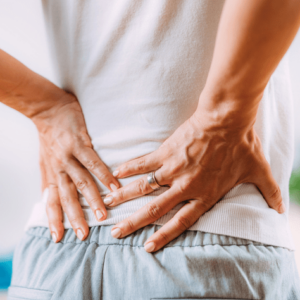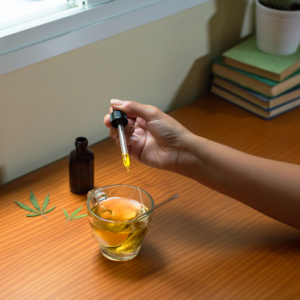Eben Britton played six seasons in the National Football League (NFL): four years for the Jacksonville Jaguars and two years for the Chicago Bears. Like many players, he was given opioids and anti-inflammatory pills to cope with the pain from the injuries he sustained while playing the game.
Now retired, he’s one of the few players to openly talk about his cannabis use while still in the league. Eben attributes marijuana to helping him manage the grueling mental and physical challenges of playing in the NFL.
Eben has now become an advocate for ending cannabis prohibition in the NFL. He also founded Athletes for Care, a support network that helps former athletes of all creeds find their footing after their sports careers have ended.
On his career after the NFL he says, “Man, this is what I’m supposed to be doing.”
Dr. Perry Solomon, HelloMD’s chief medical officer, sat down with Eben over video chat. In front of an expansive mural of Los Angeles painted by his father, Eben recounted his days in the NFL, how cannabis helped him manage pain and overcome opioid dependence, and what he’s up to now.
FOLLOW US ON FACEBOOK & INSTAGRAM
Q: You’ve been open about your cannabis use during your NFL career. Can you talk about why you decided to use cannabis, even though it was (and still is) a banned substance?
I think that to me, the more I’m out of the game, the more distance I’ve had from it, the more context behind it—it just becomes more and more clear to me that cannabis and football are really integrally related.
I would say there’s a clear correlation between my cannabis consumption and my football career. I played the offensive line—I was knocking heads. I was one of the guys dealing with those sub-concussive hits 80, 90, 100 times a day, five days a week. So to me, looking back on my career, looking back at my own personal cannabis use, I started consuming more cannabis the more football I played. And I believe that that was my body intuitively needing to be supported, basically thirsting for some sort of healing, some sort of cellular nourishment which came only from cannabis.
Q: How did cannabis help you manage the pain from injuries you sustained during your NFL career?
I suffered a laundry list of injuries—from dislocating my shoulder multiple times, to concussions, to a herniated disc in my back, which created excruciating sciatic pain that ran down my leg.
This was dealt with—at least from a pain management perspective—with a lot of prescription pills and a lot of prescription anti-inflammatories, like Indocin and Cataflam. These types of drugs are very toxic, and they create pain in the gut.
NFL players—including myself—were very much reliant on these drugs to be able to produce at 100%—or at least there was a time when I believed I needed to take these [drugs] to be able to play at 100%.
RELATED: HOW CANNABIS CAN HELP BREAK THE CYCLE OF OPIOID ABUSE
I felt many of the negative side effects that are so commonly associated with opiates. For instance, I remember after my first shoulder surgery, [I was] taking Vicodin at the time—the prescribed dosages—and I felt like my emotions, my anger and rage, all came billowing up to the surface. I was on a hair trigger—very out of control and irrational. I felt insane, felt severe discomfort throughout my body. I was in in the throes of withdrawal symptoms. … Juxtapose that to my experience with cannabis.
[Cannabis] didn’t really become something that I incorporated into my athletic career until I was in the NFL, and I was dealing with pain on a daily basis. … Time and time again it just brought me back to center. It helped not only ease the physical pain, but it was very calming and peace-inducing mentally.
Q: How did cannabis help your mental health when you were in the NFL?
[In the NFL], you’re stressed out about producing at a very high level in front of millions of people. It’s a highly competitive environment. The NFL work day starts at about 7 a.m. on the later end, the first team meeting starts at 7:30. You’re in three hours of meetings; you’ve got about an hour weightlifting session to get in there somewhere; you’ve got a two-and-a-half-hour full-speed practice; you’ve got three more hours of meetings; you’ve got walkthroughs— this is all grinding the axe.
By the time you get home, you’re exhausted—both physically and mentally. For me, cannabis really became this replenishing substance—something that I could come back to that would help me fall into a much more peaceful state of mind. I was calmed down from all the adrenaline, testosterone and cortisol I was running all day.

Q: How does cannabis fit into your life now that you’ve retired from the NFL?
I founded a company called Be Tru Organics. We do hemp-derived CBD (cannabidiol) products: an oral spray, pain relief cream and a daily vitamin.
I use our pain relief cream every day. I think it’s a fantastic method for anyone dealing with joint pain. My back hurts all the time—I don’t have full range of motion in my neck. I use it on my neck and on my shoulders and before I lift weights. I think it’s great for before and after exercise. Our pain relief cream is definitely something I wish I had when I was playing.
I’ll also do high THC (tetrahydrocannabinol) concentrates—they help me go to sleep. I also like to do them occasionally for high-intensity workout or weight-training sessions. I feel like the THC primes me in a way that’s not quite like anything else. I have a vaporizer machine that I use—a VapeXhale.
Q: There’s unprecedented support for marijuana legalization across the nation. What’s the current environment like in the NFL in terms of marijuana prohibition? Do a lot of players presently use cannabis?
It’s at least 50% of the guys in a locker room—that’s extremely conservative. I would say even upwards of 75% of the guys, especially nowadays. I think they’re becoming more aware of the positive medical benefits of cannabis, especially for football players.
I think the owners are really beginning to understand the implications of ending cannabis prohibition in the league—or whether that’s on a state-by-state basis. I think the league wants to avoid anything where one team gets a seeming advantage over another. For instance, guys on the Titans aren’t going to have very easy access to cannabis (because Tennessee still deems cannabis as an illegal substance). Meanwhile, you’ve got the [Seattle] Seahawks or the [L.A.] Rams or the [San Francisco] 49ers all with easy access to cannabis.
But among the owners, there really seems to be a quiet, under-the-surface groundswell of support, and actual ownership moving towards taking cannabis off their banned substance list. I think it’s smart—looking down the line this is going to save the league millions, if not billions of dollars in health-care costs.
I feel as though we’re all being a little naive that we don’t think the NFL is already working on some sort of product—whether it’s an inhalant, a vaporizer, a capsule, a tincture or creams. If that’s not the case, they’re falling way behind on an incredible opportunity to better the lives of their players and better the lives of athletes in the future.
Q: Do you think cannabis has medical applications in youth football?
Absolutely—that’s something that’s being navigated currently. High school is really the beginning of when these kids are developing their physical bodies to a point where they can really inflict damage on each other—and they’re taking it seriously. High school is really the initial minor leagues of the NFL—in America that’s the farm system.
It starts in high school, it moves into college, and the best of the best are sifted out ’til they eventually get to the NFL. Those kids in high school who are serious about playing the game, who play at a high level, should be doing everything they can to protect their brains and mitigate as much of that damage as possible.
I’ve studied a lot of plants and herbal remedies—ancient and Ayurvedic, traditional Chinese medicine—there’s no other substance on this planet that I know of that has the same neuroprotective qualities that cannabis does. And from what I can tell, from what I’ve experienced, football does a lot of damage to the brain—that’s what we’re seeing. Cannabis seems to be a good start in mitigating that.
Q: Given the state of the NFL and football in general, would you let any of your children play the game?
My wife, she would say absolutely not. I wouldn’t be encouraging it, but I wouldn’t tell my son “no” if he truly wanted to play football. That’s a tough one—it’s a sad realization. There are other games to play: There’s basketball; there’s track and field; there’s a lot you can do that doesn’t involve smashing your head and other people with you.
I think Pop Warner football should probably be done away with completely. I don’t think kids should be putting on helmets and playing full contact football until they’re least 14 years old. People who started playing football before the age of 14 are seemingly at a much higher risk for developing CTE (chronic traumatic encephalopathy) later in life. It’s what a lot of the research and science has shown.
I think that would do away with a lot of the damage right away—if we made that move. Young kids can play other sports: flag football, basketball, baseball—you can learn a lot from those games.
Q: You’re working to improve the lives of athletes, and cannabis is just one part of that—let’s talk about Athletes for Care. How did it come about and what do you hope to accomplish?
Athletes for Care was inspired out of myself and Nate Jackson—my good friend and another former NFL player—talking about our experience dealing with injuries, and the positive effect cannabis really had for us compared to the opiates and the anti-inflammatories. We realized that there are a lot of guys that shared that story and a lot of guys who need to be educated, who are in really bad places—really struggling, really suffering. Their families are falling apart—they’ve had a really difficult time re-identifying themselves as people in their lives after sports.
That’s why we created Athletes for Care. We wanted to create a resource for athletes—men and women of all ages. It’s not only for former professional athletes, it’s collegiate level and high school. It’s about offering the support and resources necessary for re-identifying yourself in life after sports. We wanted to create a little hub and cannabis is just one component of that.
There are entrepreneurial programs; there’s investment and financial support. We have an actual support group network: the Athletes Afterlife program, which is a network of men and women who have all been through this transition of moving from one career to the next.
We wanted to offer a support system where you can pick up the phone and call somebody who’s been through something similar to what you’ve been through. … It’s a preventative as much as anything. If [current athletes] are bringing this into their thought process, their transition to life after sports is going to be a much smoother.
We’re really encouraging connection with the league right now. We’ve had some great phone calls with the NFLPA (NFL Players Association), the union.
Q: What are some other things—besides cannabis—that you incorporate into your lifestyle to stay healthy?
Meditation is number one. I think every single person on the planet should be meditating at this point. Other than that, I would say sticking to a ketogenic diet, a high-fat diet—low carb, high vegetable content. Eating as much organic, grass-fed foods as possible—sticking with real foods.
I use curcumin on a daily basis—I think it’s fantastic for inflammation. For my mental clarity, I also take a number of mushrooms—lion’s mane mushroom has some fantastic neurological effects, as well as chaga and cordyceps. These mushrooms have profound neuroprotective qualities and anti-cancer qualities. [They] really affect my joint pain and keep me feeling good throughout the day.
I do some sort of exercise just about almost daily—I’d say at least six days a week. It just makes me feel good—whether that’s yoga or going on a hike, I’m getting out in nature. I still like to lift weights. I can be much more productive in the weight room these days and not tear myself down because I’m not trying to lift the world—I’m just trying to feel good.
If you’re new to cannabis and want to learn more, take a look at our Cannabis 101 post. HelloMD can help you get your medical marijuana recommendation; it’s easy, private and 100% online.






